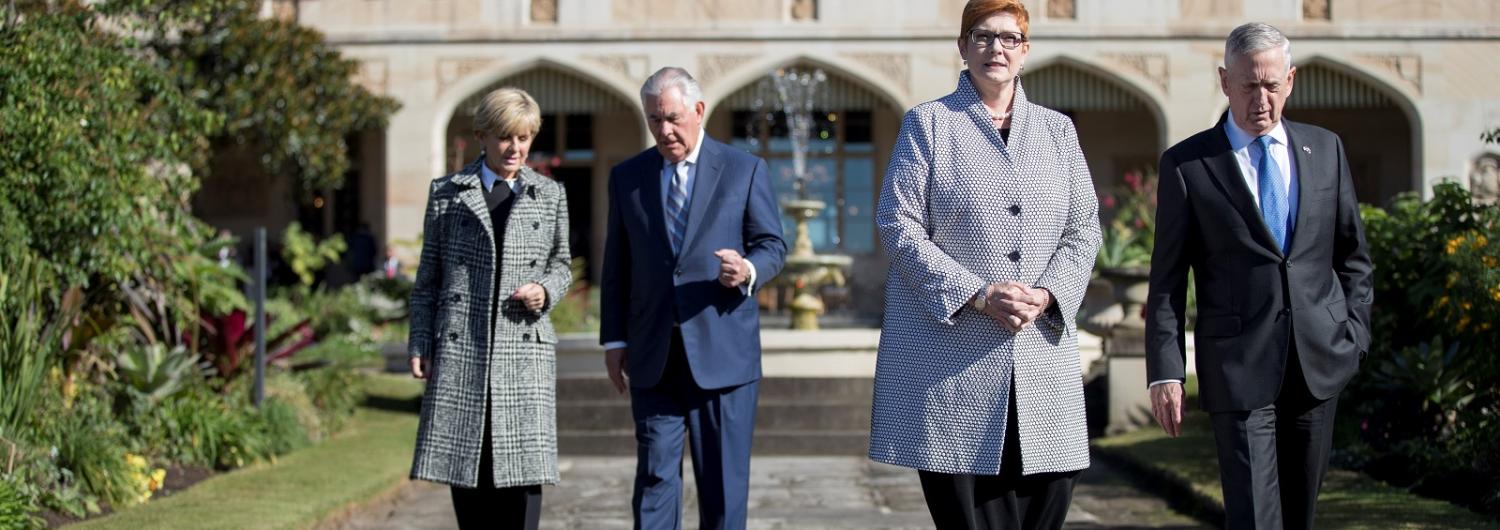The Australia-US Ministerial Consultation (AUSMIN) on Monday was noteworthy for how normal it was. The meeting stood in stark contrast to the recent NATO Summit, where President Trump managed to raise more questions about the American commitment to the trans-Atlantic alliance than he answered. In Sydney, the four ministers sung from the same hymn book about common values and interests and renewed their strong commitment to fighting terrorism. Where the European allies suffered repeated blows over burden-sharing, AUSMIN emphasised how much the two allies are doing together to counter new threats.
No doubt a big part of the difference was that President Trump headlined the NATO summit (with a script clearly written in part by the darker side of the White House), while AUSMIN was led on the US side by Secretary of State Rex Tillerson and Secretary of Defense James Mattis, who sounded remarkably like their predecessors in the previous two administrations. Some commentators have argued that Australia should therefore not rest easy, since Australia might get the European treatment when the President shows up. Could be, but I doubt it. For one thing, American public opinion polling shows significantly more support for Asian allies than NATO. Moreover, Australia has put in place a serious plan to hit its target of 2% of GDP spending on defense, where many NATO countries have only made vague commitments on how they would achieve the 2% target they pledged in 2014.
Malcolm Turnbull’s commendable speech at the Shangri-La dialogue also set the stage. He called out China for its coercive behaviour in the region and avoided all but the most indirect expressions of concern about the worrisome aspects of the Trump administration’s foreign policy. Other than Theresa May, no European ally has shown such restraint. In Asia, Abe and even Moon Jae-in have. One more reason that the Asian summits seem to go better.
Finally, there is a deeply rooted anti-Europeanism in the Trump White House that is not relevant to US-Australia relations. George Washington’s famous farewell address warning against long-term alliances was about Europe. The isolationist 'America First' movement in the 1930s was also a rejection of the European (and especially British) connections of the East Coast elite by activists from the mid-West who had strong Irish or German roots and feared European entanglements would corrupt the purity of the American republic. In the early days of NATO, some of the strongest critics of the alliance were the Congressional members of the Asia First lobby who wanted Red China to be the primary target of American defensive efforts rather than Soviet expansion in Europe. In other words, the dystopian vision that Trump advisors like Steve Bannon dread is one in which America becomes Europe – not Australia. Small comfort perhaps (trans-Atlantic ties are fundamental to the entire neoliberal order), but certainly cause for more optimism about President Trump’s demeanour towards American alliances in Asia when he comes out to the region in the fall.
The one aspect of AUSMIN that was different from the past was the strikingly strong language on North Korea. When Mattis called the North Korean threat a 'clear and present danger' in his Shangri-La speech just before AUSMIN, he had constitutional scholars scratching their heads because (other than Hollywood movies), this term has only really used in Supreme Court cases testing whether freedom of speech might be curtailed in wartime. Presumably, that was not the intent of the Secretary of Defense. Pressuring North Korea was. Two US carrier battlegroups were exercising with Japanese forces in the North Pacific throughout Shangri-La and AUSMIN and the Trump administration intends to push North Korea even harder. This is appropriate given the escalating nature of the North Korean missile and nuclear threat, but where it all goes is somewhat less clear. The President and the Secretary of State have all implied that China will do more to help curtail the North’s weapons programs, but few experts who have followed China-North Korea relations expect Beijing’s approach to be tough enough to fundamentally change Kim Jong-un’s calculations. We will see.
In any case, this North Korean is increasingly at Australia’s doorstep given the range and the threatening rhetoric of the Kim regime. The combination of the US-Japan-Australia trilateral defence talks in Singapore and then AUSMIN’s focus on North Korea demonstrate an intention by Canberra not to ignore the threat. And since the Trump administration is not yet sure where its policy goes, Australia should have a say on that strategy too. That is the kind of thing AUSMIN is for. Nice to have it functioning well despite chaotic scenes last week with American alliances on the other side of the world.

